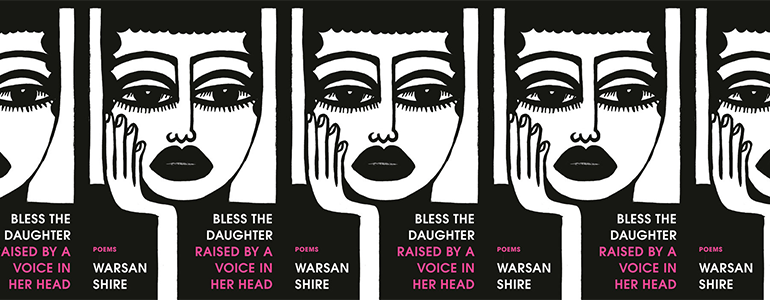Bless the Daughter Raised by a Voice in Her Head’s Language of the Body

Inside the title of her debut poetry collection, out this past March, Warsan Shire nests slivers of multiple poetic obsessions. Bless the Daughter Raised by a Voice in Her Head suggests both the mature woman fierce enough to spiritually conceive herself and the vulnerable girl surviving a mother’s abandonment. We hear the inner voice of mental illness hovering, but also an empowering spiritual presence speaking. Ultimately, the title becomes a prayer to the voice of poetry itself, affirming that spoken word, like a mother’s love, might rescue us.
While the thirty-three-year-old Somali British poet listens attentively to her inner voice and those of the Somali refugees she often portrays, she works most deeply through a language of body. Via the body, she wrenches us into sensuous and traumatic narratives that express hunger for love, rage at violation, the turmoil of illness, and an exquisite wish for restoration.
As she has in her earlier chapbooks, from which this collection often draws, Shire flows organically between confessional poet and documentarian. She opens the volume transparently with “Extreme Girlhood,” declaring her troubled mental state to the divine and to us. “Are you there, God? / It’s me, Warsan. / Maladaptive daydreaming, / obsessive, dissociative.” Her poems often read like lineated dream diaries or urgent whispers to a silent confidante.
But one individual woman’s wounded self also bears the injuries of women collectively, as well as those of the Somali community that endures ongoing civil war. The shocking opening line of “Your Mother’s First Kiss” marks a child rapist as a symbolic perpetrator of violence against all women in the Somali conflict: “The first boy to kiss your mother later raped women / when the war broke out.” In the gauzy horror that unfolds, years after a rape initially masquerading as a kiss, mother and daughter sight the man driving a public bus and together realize by facial resemblance that he is the girl’s father.
Shire tells a similarly excruciating tale of one woman’s violated body carrying the pain of collective violation in “Home,” the poem that brought her international attention when the New York Times editorial board, a British parliamentarian, and actor Benedict Cumberbatch all quoted it to highlight the worldwide plight of refugees. In the less politically serviceable prose of the final section, the speaker thanks God for saving her from war, despite the humiliations and abuse of life in exile. “Alhamdulillah, all of this is better than the scent of a woman completely on fire, a truckload of men who look like my father—pulling out my teeth and nails.”
Many members of Shire’s extended family are refugees of a war that began in 1991 and continues to rage. Over three million Somalis have been displaced and hundreds of thousands have been killed, many from famine. As government repression increased, Shire’s family fled to Kenya in 1988, after her father, a journalist, was threatened with imprisonment. Her mother was pregnant at the time and gave birth to Shire in Kenya. In 1991 they moved to London, where many of Shire’s extended family members came to reside as she was growing up.
Shire regards her writing as a much-needed mirror for this traumatized community in exile, subject to racism and social marginalization in the UK. “I am documenting stories of Somali people because I feel it’s my responsibility to do so,” she said in a February NPR interview. “These stories are my stories. They’re everything that I come from.
Following her father’s path, Shire has adopted the craft of journalist and oral historian. And she has born visceral witness from a paradoxical position. While she details the horrors of war and displacement with the immediacy of surreal close-up photography, she herself did not visit Somalia until 2013, after she’d written “Home.” But like most skilled character poets, Shire has listened and observed all her life. As a child she would sit in the living room alongside visitors who sipped qaxwo, a spiced Somalian coffee, as they shared intimate details of their everyday lives. In more recent years, she has interviewed family and refugees in the community, learning from those who’d witnessed atrocities or experienced them directly.
While most of “Home” concerns the trials of escaping from one’s home country, Shire also draws attention to the subsequently brutal reception refugees face upon settling in the UK. A paraphrased litany of the most toxic anti-immigrant tropes, familiar to anyone in the US or the UK, is a visceral assault that conveys how the war on the refugee body continues even after they reach supposedly safe shores. “Go home Blacks, dirty refugees, sucking our country dry of milk, dark with their hands out, smell strange, savage, look what they’ve done to their own countries, what will they do to ours?” Shire shows in “Assimilation” how refugees become spiritually dislocated by these assaults. She creates a sense of communal disruption by shifting pronouns through four successive stanzas, moving from we (“We never unpacked”) to you (“your father cries into his hands”) to I (“I can’t get the refugee out of my body”) and finally to the more remote they. This concluding stanza dramatizes how refugee pain can produce both a literal and figurative medical condition, potentially lethal if body and mind fail to adapt. In full, it reads:
“The refugee’s heart often grows / an outer layer. An assimilation. / It cocoons the organ. Those unable to grow an extra skin / die within the first six months in a host country.” By fusing the clinical and the lyrical, Shire transfigures the poem into a magical realist montage of injured souls.
Shire highlights how refugees can become wounded into self-protective escape through tender portraits of her uncle in “My Loneliness is Killing Me” and “Midnight in the Foreign Food Aisle.” These poems particularly stand out in the collection because Shire’s earlier poetry rarely centered men as subjects. The first poem finds the uncle smoking alone in a room, the tobacco inducing a set of plaintive homeland memories. He swims at a Mogadishu beach and drives a motorbike through an open-air market, “held onto by women with hair / trailing behind them black like smoke.” He ends up listening to a Somali singer on an old cassette player, perhaps because he salvaged tapes when leaving Mogadishu or perhaps because it’s the only audio equipment he can afford. Music and memory are the closest human contact he seems to receive living in London. Shire urges him to endure. “Cidlada ka atkow, Abti—be stronger than your loneliness.”
“Midnight in the Foreign Food Aisle” presents the uncle as even more deeply alone—his alienation plays out in public space. He becomes like those foreign foods shelved in the segregated supermarket aisle, objects consigned to a catch-all ethnic ghetto. Shire writes in letter form, asking, “Dear Uncle, is everything you love foreign / or are you foreign to everything you love?” He appears to disown himself by seeking sex with white sex workers, becoming desperate and isolated “after years of fucking / women who are unable to pronounce your name.” In “My Loneliness is Killing Me,” the uncle has only memories of a lost Somalia to genuinely nourish himself. Smelling the turmeric and saffron in the food aisle, he remembers his mother’s hands preparing halal meat, “praying in a / language you haven’t used in years.” This last line does not seem literal, since living in the Somali community of exiles her uncle would presumably still speak Somali, but it appears that without the sights, sounds, and sensations of home to affirm him, the language has been depleted. We sense this man surrounded by food is actually starving, unable to receive intimacy either through words or by touching another person’s body.
Shire’s women refugees suffer even more severely; a vicious Somalian cultural sexism links the war and immigration trauma. “Bless Your Ugly Daughter” dissects how a young Somali girl’s body becomes a map of that trauma: “Your daughter’s face is a small riot, / her hands are a civil war, / She has a refugee camp tucked / behind each ear, her body is a body littered / with ugly things.” The girl appears to be blamed for causing the trauma herself, as though her supposed ugliness somehow engenders the ugly pain of the refugee condition. She carries something akin to original sin and, even as an infant, is assaulted for it, “forced to gargle rosewater” that might somehow purify her body. The moments are rare and tenuous when girls’ bodies have permission to soften, sprout with beauty, and tremble tenderly toward womanhood. From birth onward their bodies are more often abused and mocked, forced to become self-preserving weapons of revenge and made to war against themselves through self-harm.
War and exile are apt metaphors for a young girl with a wounded body she turns against herself. Shire has been open about her lifelong battle with bulimia. In “Bone,” she hears another young woman throwing up, but we sense she is that woman exiled from her own body: “She looks the way I did when I was fifteen / Full of pulp and pepper. / She spends all day up in the room / measuring her thighs.” Shire links the self-abuse to parental violence, stating baldly that “her father likes to punch / girls in the face,” and an earlier version of “Home,” titled “Conversations From Home,” published in the chapbook Our Men Do Not Belong to Us (2014) could be read as figuratively linking the eating disorder to refugee trauma: “I tore up and ate my own passport in an airport hotel. I’m bloated with language I can’t afford to forget.” Shire documents the actual symptoms of a potentially grave clinical condition, but bulimia also serves as an anguished metaphor for how women act out abuse they have suffered against their bodies. They binge obsessively to fill an emotional void and vomit self-rejection in a distorted effort to reclaim and heal the bodies that others have tried to subjugate.
Shire’s poems addressing female genital mutilation, which is inflicted on ninety-nine percent of Somali girls, according to a 2020 Somali government report cited by the United Nations, are equally devastating. While not graphic, these poems are acutely disturbing—the offstage violence is set against tender sexual awakening. In “The Abubakr Girls Are Different,” which reworks the earlier poems “Mermaids” (first published in the Spring 2015 issue of Ploughshares) and “Things We Had Lost in the Summer” from the chapbook Teaching My Mother How to Give Birth (2011), five girls return home from an unidentified foreign location after suffering mutilation. “Amel’s hardened nipples push / through the paisley of her blouse, minarets / calling men to worship.” We realize only in the second to last stanza, obliquely and metaphorically, the surgery that has been perpetrated, understanding it is punishment for becoming sexual. “After the procedure, the girls learn how to walk again, mermaids / with new legs.” One girl does affirm her womanhood, whispering that she has begun to menstruate, but no one speaks of the mutilation. Instead, they lie together in bed, silently holding mirrors below their skirts, a concluding moment of both commiseration and dissociation.
This poem depicts how women within a family speak of and yet cannot speak of such violence. In “Things We Had Lost in the Summer” the aunt whispers by phone, “Are they all okay? Are they healing well?” It is a tragic moment of a helpless mother figure who can only hope that the pain of what Shire equates to limb amputation might be minimized. She cannot speak aloud because a forbidding father looms silently in the background. Daughters long for maternal care, but mothers fail to protect and even betray their bodies. In “Hooyo Isn’t Home” Shire speaks of mothers literally asleep and mentally oblivious as their daughters are sexually abused. When the girls show disturbing physical and behavioral symptoms of this trauma, the mothers resort to calling for exorcists, who are men. The isolated speaker struggles to comfort her dissociated naked self: “While in the shower, you break down. / While you wash your body, you realize it is not your body. / And at the same time, it is the only body you have.”
A continuous thread through Shire’s work has been a fierce mother-daughter dance. We witness the roiling energies wrestling within Shire herself across the fourteen years between when she began composing poems for Teaching My Mother How to Give Birth at age nineteen, and the publication of this new collection. In a February Guardian conversation with 2019 Booker Prize winner Bernadine Evaristo, Shire, reflecting on the book, said, “It feels really massive, like I went from a girl to a woman in the middle of writing it.” During the writing process she became a mother herself of two sons. But Shire had been playing a mother role since she was twelve, when her mother remarried and had three daughters who Shire helped raise as a “shift mother,” as she put it in a February New Yorker feature. This history as caretaker sheds light on the role-reversing paradox of her first chapbook’s title and serendipitously echoes the title of Evaristo’s Booker prize-winning novel, Girl, Woman, Other. Shire has partly mothered herself into her womanhood. And writing poetry has been a potent tool to usher the passage.
“You Were Conceived” narrates a marital passage in which a young bride lacks maternal or other family witness to honor her. Following a secret marriage the previous night, she lies in her bed for days after her new husband licks her until he is exhausted, then leaves for unexplained reasons the next morning, though she begs him to stay. “I stayed like a secret in his bed for days / until his mother found me.” The bed becomes a sexual consummation altar, a soft womb of the unrealized self and a tomb all at once—the full life cycle. The speaker’s mother is absent, while she is essentially invisible to her husband’s mother. “I stood in front of her naked,” she says, “waved my hands in her face,” as the mother-in-law collapses on the floor, aware only of her lost son, who we learn has died. No one recognizes the wife at the funeral. She is a woman left to be mother, daughter, and wife only to herself.
The tragedy in stories like “You Were Conceived” is how human cruelty in a consistently merciless universe thwarts nearly every quest to be loved, to be seen, and to find a home, as refugee and as woman. Sex is often anguished, intimacy fused with violence, and women can be both predators and prey. “The Kitchen” might be Shire’s most openly erotic poem, sprinkled through with images of papaya, coconut, cinnamon, and sugared lemon while a man goes down on his wife over a kitchen counter. But it is fueled by an undercurrent of aggression. The whole time she is seducing him away from the other woman she knows he is fantasizing about. Even when sex begins with tenderness, we hold our breath, awaiting the betrayal and rage. “Fire” portrays a woman who, taunted by her husband’s lover, douses herself with gasoline, then draws him into a bedroom self-immolation. “She straddled him on their bed, held his face / against her chest and lit a match.” Shire insists we dwell with her in the unbearable place where horror and desire collude.
At times Shire exaggerates scenes of this kind into savage satires. The sarcastically titled “Bless This House.” is an extravagant revenge fantasy that follows the terse retelling of a rape. “I said Stop, I said No and he heard nothing.” The man could never have anticipated the decisive riposte that follows: “Perhaps she has a plan, perhaps she takes him back to hers. / Perhaps he wakes up hours later in a bathtub full of ice, / dry mouth, flinching at his neat, new incision.” She shows him she’s wearing his penis as a trophy and then bonds with her mother, who, in parallel emasculation, gags the father with an apple on the dining room table—a man’s worst nightmare of a wife cannibalizing his virility. This theatrical retribution feels like a response not only to this individual offender, but to the whole ilk of perpetrators who populate the poems in this collection. Revenge is also a darkly comic role reversal that enacts a mother-daughter bonding not possible elsewhere through caring, though revenge against men’s bodies will never restore their own.
In Shire’s pained universe, shared sexual intimacy, love, comfort, mothering and renewal are possible. But usually the women who long for such experiences remain alone. The world does not outwardly grant these gifts. The women must instead compose them internally, often in prayers, and, by Shire’s model, through poetry. “Victoria in Illiyin” envisions a paradise of compassion to heal a hell on earth that Shire the documentarian reports in a footnote. Victoria Climbié was an eight-year-old child from Ivory Coast raised by extended family in London. As in many of Shire’s poems, a child left alone by parents becomes vulnerable to violation. Victoria was tortured and murdered by a great-aunt and the aunt’s boyfriend, leaving 128 documented injuries on her body.
Calling this West African child “Our Victoria” to open this prose poem, Shire has her represent victimized girls from across the continent and beyond who will never be allowed to enjoy girlhood or imagine themselves as women. Shire then floats her into watery bliss. “Our Victoria growing gills in paradise, arms outstretched in joy, wading in rivers of warm milk, swimming with the lost babies of Eden, back strokes in the streams of heaven.” This heaven is as much a nurturing pre-birth womb as it is an afterlife, a place we sense Shire wishes for herself to reside, as both the mother and the wounded child that a mother brings into a generous world. The poem ends, “Blessings to Our sweet Victoria, rewarded with 72 devoted mothers who delicately dry her small body with wool softer than skin.”
Though publicity from the case led to major changes in British child protection laws, our Victorias will not receive bodily redemption in the terrestrial world, nor will the women raped and abused in silent bedrooms and crowded refugee camps, nor the Somalis ravaged by civil war then denigrated when they seek asylum as immigrants, nor those who internalize these violations and turn them against their own bodies. As an artist dedicated to witnessing these truths, Shire does not give us stories that cleanly resolve, fully restore, or allow untroubled love. She remains exacting, holding our gaze to the nearly unspeakable. Only then can any of us hope to gain refuge.
This piece was originally published on May 26, 2022.



